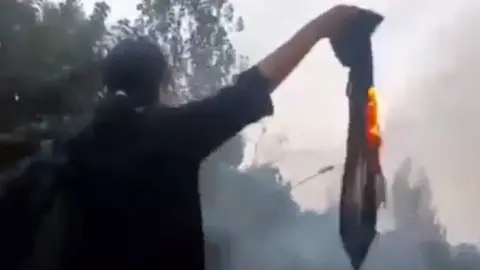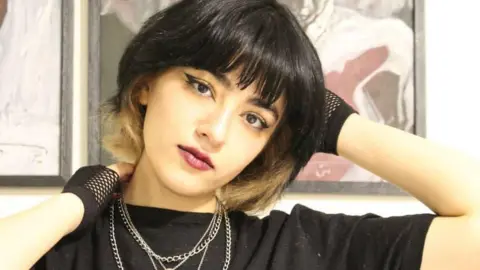Nika Shakarami: Videos show Iran teenager protesting before death
 Twitter
TwitterVideos posted online show an Iranian teenager protesting hours before her death, her mother has told BBC Persian.
Nika Shakarami, 16, is seen standing on a dumpster and burning her headscarf in Tehran on 20 September, as others chant slogans against the Islamic Republic.
She later disappeared after telling a friend she was being chased by police.
Her mother, Nasrin, also denied she was in a CCTV video put out by officials to support their claim that her death was not connected to the protests that day.
Mrs Shakarami has accused security forces of murdering her daughter, but officials have said she died after being thrown from a building that was under construction, possibly by workmen.
Last week, Iranian state TV broadcast blurry footage showing a teenage girl or woman whom it identified as Nika walking down an alley and entering a building through a door.
Allow X content?

But Mrs Shakarami told BBC Persian on Monday that the person in the video was not her daughter. Another source close to the family also said that they did not walk like Nika.
Mrs Shakarami also alleged that her sister Atash and brother Mohsen had been forced into making false statements about Nika's death while they were in detention.
"They threatened to detain my brother's four-year-old child," she said.
Mohsen was shown on TV last Wednesday night speaking against the current protests, as someone off camera seems to whisper to him: "Say it, you scumbag!" Atash was meanwhile seen saying that Nika "was killed falling from a building". They were released after making the statements.
 BBC Persian source
BBC Persian sourceNika's family have said they located her body at the mortuary 10 days after she went missing, and that they were only allowed by officials to see her face for a few seconds in order to identify her. Atash has also said that the Revolutionary Guards told her that Nika was in their custody for five days and then handed over to prison authorities.
Mrs Shakarami said Nika had disappeared hours after attending the protest seen in videos that have surfaced on social media in recent days.
One of the videos show a girl dressed in black standing on a dumpster on a street and waving a burning headscarf. A crowd around her is heard chanting "death to the dictator" - a reference to the Supreme Leader, Ayatollah Ali Khamenei, who has the final say on all state matters. Another video shows the same scene from a different angle.
Allow X content?

"Like Nika, I have been against compulsory hijab since I was a child. But my generation was not brave enough to protest," Mrs Shakarami told BBC Persian.
"People my age accepted years of suppression, intimidation and humiliation, but my daughter protested and she had every right to do so."
"Generation Z" - defined as those born between 1997 and 2012 - have been at the forefront of the protests sparked by the death of Mahsa Amini, a 22-year-old woman who was detained by the morality police for allegedly violating the Islamic Republic's strict hijab law.
Nika is not the only young female protester to have been killed during the unrest.
The family of Hadis Najafi, 22, have said that she was shot dead by security forces while protesting in the city of Karaj, west of Tehran, on 21 September.
Another 16-year-old girl, Sarina Esmailzadeh, allegedly died after being severely beaten on the head with batons by security forces during protests in Karaj on 23 September, according to Amnesty International.
On Monday, the Iranian Society for Protecting the Rights of the Child reported that a total of 28 children had been killed during the protests.
Many other children had been arrested and were being held at detention centres, the group said.
